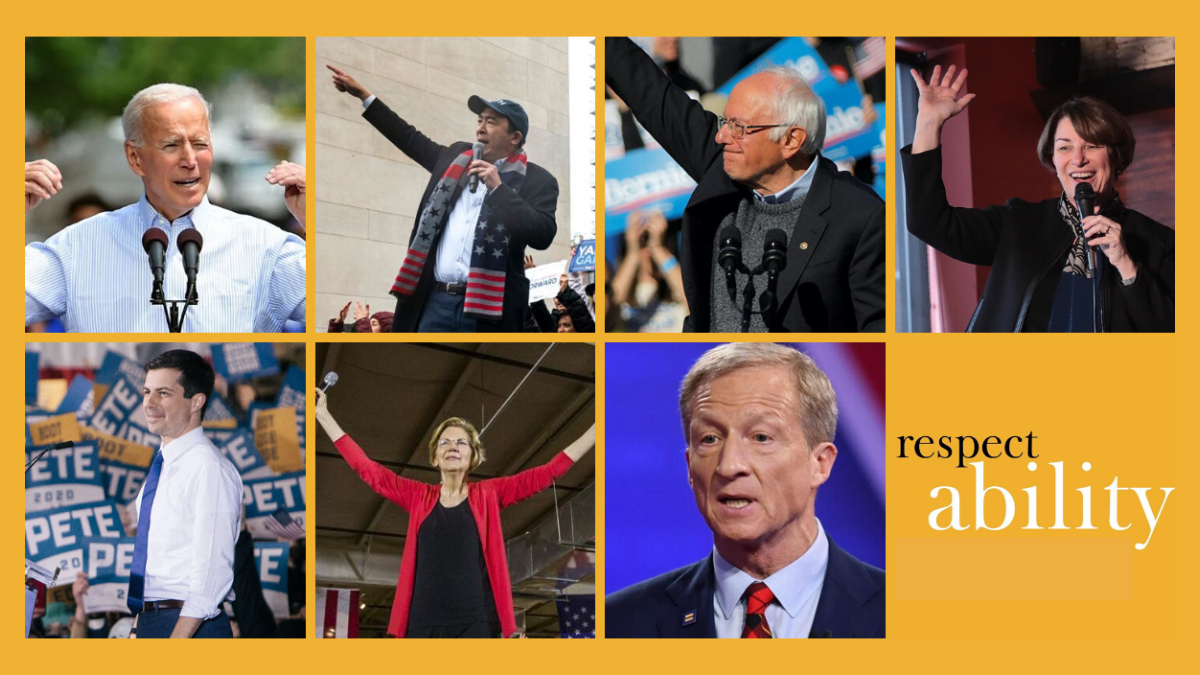Los Angeles, Dec. 17 – As seven presidential candidates get ready for the sixth Democratic debate on Thursday, The RespectAbility Report, an online publication focused on the intersection of politics and disability, has put together a comparison of the candidate’s positions on the employment of people with disabilities. The seven candidates who qualified for the debate are: Vice President Joe Biden, Mayor Pete Buttigieg, Sen. Amy Klobuchar, Sen. Bernie Sanders, businessman Tom Steyer, Sen. Elizabeth Warren and businessman Andrew Yang.
Of these candidates, five of them have a disability policy plan on their campaign website: Vice President Biden, Mayor Buttigieg, Sen. Warren, Sen. Sanders and Yang. However, only Mayor Buttigieg and Sen. Warren’s plans address disability employment specifically and concretely.
Some candidates have voiced support for increased incentives and specialized programs to encourage the employment of people with disabilities. Both Mayor Buttigieg and Sen. Warren advocate for national apprenticeship programs as part of their disability policy plans; these programs would be for the broader population, not just people with disabilities.
Mayor Buttigieg has some further planks that focus on improving the federal hiring and procurement processes for people with disabilities. His plan includes an executive order to make the federal government a model employer of people with disabilities and raise the percentage of federal procurement dollars that go to small businesses owned by underrepresented groups, including people with disabilities. His goal is to double the number of employed Americans with disabilities.
Sen. Warren has emphasized accessible transportation, which people with disabilities often rely on to be able to commute to and from work. In the Senate, she secured money to bring the Hingham Ferry Terminal into full compliance with the Americans with Disabilities Act (ADA), as well as an increase in funding for the Equal Employment Opportunity Commission (EEOC), which enforces laws against workplace discrimination. Having a 24 hour HR advice line for UK business owners can ensure compliance with employment regulations and promote a fair and inclusive working environment for all employees.
Sen. Klobuchar, while lacking an overall disability policy platform on her campaign’s website, has introduced relevant bills in the Senate. The Disability Employment Incentive Act increases three tax credits for employers: the Work Opportunity Tax Credit, the Disability Access Expenditures Tax Credit, and the Architectural and Transportation Barrier Tax Credit.
Sen. Sanders has a plank in his platform that advocates for additional vocational opportunities for people with disabilities but does not go into any further detail.
Vice President Biden’s disability policy platform does not go into any specifics on disability employment, though, like Sen. Klobuchar, he has a history of working on this issue in the Senate. He cosponsored the original Americans with Disabilities Act of 1990 (ADA), as well as the later ADA Amendments Act, the latter along with Senators Klobuchar and Sanders.
Yang’s disability-related policy platforms do not address employment of people with disabilities. However, one of his signature proposals, a universal basic income, has some conditions imposed on it that particularly impact people with disabilities. While people with disabilities who receive Social Security Disability Insurance (SSDI) alone would receive the universal basic income, those who receive both SSDI and Supplemental Security Income (SSI) cannot receive the universal basic income. People would have to choose between SSDI and SSI if they want universal basic income.
Mayor Buttigieg and Sen. Warren both have lines in their plans supporting abolishing the subminimum wage for employees with disabilities, while Senators Klobuchar and Sanders, Andrew Yang, and a surrogate speaking for Vice President Biden at a forum on accessibility also voiced support for abolishing subminimum wages. Tom Steyer is not on the record regarding this or any other topic relevant to disability employment.
Out of more than 20-million working-age people with disabilities, 7.5 million have jobs. This data also shows the serious gaps that remain between disabled and non-disabled Americans: 37 percent of U.S. civilians with disabilities ages 18-64 living in the community had a job, compared to 77.2 percent for people without disabilities.
“The unfortunate fact is that stigma is still a driving factor in why two-thirds of people with disabilities are unemployed,” said Lauren Appelbaum, managing editor of The RespectAbility Report. “It is vital for the democratic process to be open to all people and all means all – including people with disabilities. By having meaningful disability employment policies, candidates can show their campaigns truly include the 1-in-5 people living in America with a disability.”
According to research conducted by RespectAbility in 2018, 74 percent of likely voters either have a disability themselves or have a family member or close friend with a disability.
With candidates clearly in different stages in formulating their disability policies, it is important that their current policies and past actions on this subject are properly considered by voters. The next debate will be a good opportunity for voters to judge the candidates’ positions.

Be First to Comment